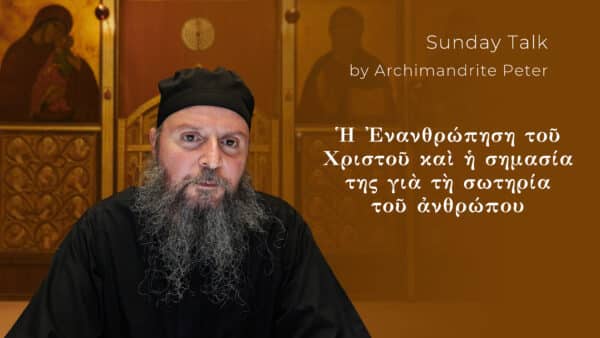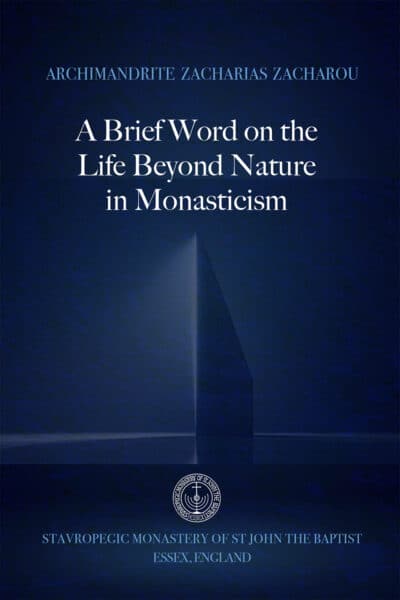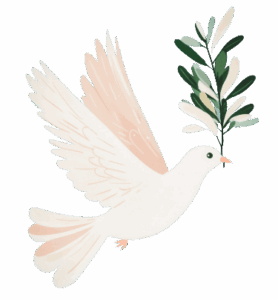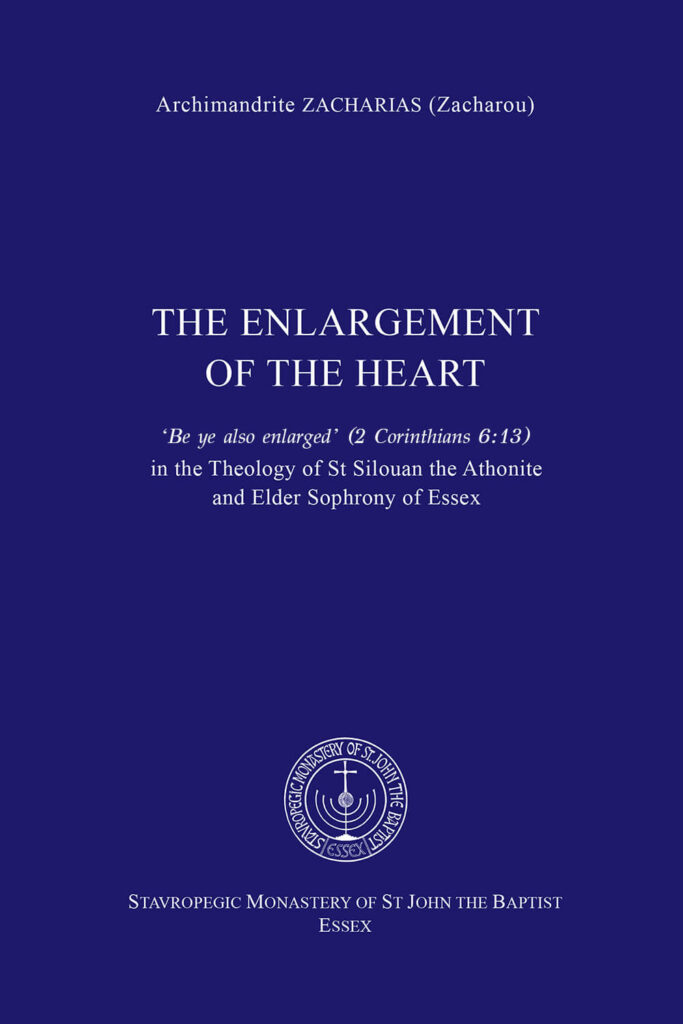Question: Could you tell us something about his last days of Father Sophrony?
Answer: I do not know what to say. He was ‘a man of God’, all his being was wrapped in God until the end. As he was very noble and kind, when he was speaking with me in Russian or in Greek, he would never address me in the singular, but always in the plural. He was strict with us when he perceived pride in us because he knew that if he did not ‘service us’ we would have a crash. Otherwise, he was very loving and very kind. We used to go and tire him, especially myself, because I had a lot of questions. When he got tired, in order to tell us that it is enough, he would say a very nice rhyme in Russian, like a poem:
‘Allow me to express my gratitude and, with heartfelt satisfaction, take my leave.’
Two weeks before he passed away, as he was accompanying me to the door of his house, he looked at the crypt and asked, ‘How long will it take for it to be finished?’ I answered ‘Two more weeks, I suppose.’ He replied, ‘For me it is difficult to wait even one hour: I have said everything to the Lord; now I must go.’ It must be wonderful to feel in your heart that you have spoken to the Lord to the end, and that remains in eternity, and then you are ready to go.
The Enlargement of the Heart
‘Be ye also enlarged’ (2 Cor. 6, 13) in the Theology of Saint Silouan the Athonite and Elder Sophrony of Essex
I went to see him again, about a week before he died, he was already lying in bed, whereas before he was always sitting in an armchair. He said to me, ‘Have you written the book I asked you to write?’ He had asked me to write a book, which I managed to bring out only last summer. I told him I had written two chapters, and I explained to him what their content was. He said, ‘you must put them at the beginning,’ and then he added, ‘I will tell you the four central points of my theory about personhood.’ in brief, he gave us all his theory about the ‘hypostatic principle’, as he calls it. It was about a page long, but very fundamental – four points, and he was telling me how to proceed in writing the book.
Four days before he died, he closed his eyes, and would not speak to us anymore. His face was not sad at all. It was luminous and full of tension. he had the same expression as when he would celebrate the liturgy. Two or three weeks before he died, he invited each of the brethren to go and sit with him for about an hour in his kitchen, for their last conversation. From then on, the fathers who had the key to his house, would go to see him every few hours. We would go in and say, ‘Благословите, Отче’, ‘Your blessing, Father.’ He would not open his eyes or utter a word, but he would lift up his hand, blessing us. he blessed us without words, and I understood that he was going. So, myself, I did not want to retain him. before I used to pray that God extend his old age, as we say in the Liturgy of Saint Basil the Great: ‘τὸ γῆρας περικράτησον’, ‘succour the aged’, but during those days I saw that he was going, and so I began praying with the words of St Peter: ‘O God, grant a rich entrance to Thy servant,1Cf. 2 Pet. 1:11. and place his soul together with his fathers,’ and I named all his fellow ascetics that I knew he had known on the holy mountain, starting with St Silouan, and then all the others.
On the last day, I went to see him at six o’clock in the morning. It was a Sunday, and I was celebrating the early Liturgy, while Father Kyrill together with the other priests were to celebrate the second Liturgy. I realised that he was going to leave us that day. I went and started the Prothesis; the hours began at seven o’clock, then the liturgy followed. During the liturgy, my prayer was continually, ‘Lord, grant a rich entrance into Thy eternal Kingdom to Thy servant.’ That liturgy was really different from all the others. The moment I said: ‘The holy things unto the holy’, Father Kyrill entered the altar. We looked at each other, he began to sob, and I realised that Father Sophrony had gone. When I asked what time he departed, I realised that it was the time I was reading the Gospel. I went aside, because Father Kyrill wanted to speak with me, and he told me, ‘Take communion give communion to the faithful, and then announce the departure of Father Sophrony and serve the first Trisagion; and I will do the same in the second Liturgy.’ So I parcelled the lamb, I partook, I gave to the faithful, and I finished the liturgy. (I don’t know how I managed.) Then I came out and I said to the people,
‘My dear brethren, Christ our God is the sign of God for all the generations of this age, because in his word we find salvation and the solution to every human problem. But the Saints of God are also a sign for their generation. Such a father God gave us in the person of Father Sophrony. In his word we found the solution to our problems. And now we must do as the liturgy teaches us, that is, ‘to give thanks’ and ‘to make entreaty’, ‘to supplicate’. Therefore, let us give thanks to God who has given us such a father, and let us pray for the repose of his soul. Blessed is our God…’
and I began the Trisagion.
We put him in the church for four days, because the crypt was not yet finished and the tomb was not yet built. We were continually reading the holy Gospels, from the beginning to the end, again and again, as is the custom for a priest. We read the holy Gospels, and we read the Trisagia and other prayers; we had the services, the liturgy, and he was there, in the middle of the church for four days (it was really like Easter, such a beautiful and blessed atmosphere). No one showed any hysteria. There was great peace. All of us prayed with inspiration. A friend of the monastery, who later on was ordained as a Bishop, came as soon as he heard that Father Sophrony had died. He felt the atmosphere, and said to me, ‘If Father Sophrony is not a Saint, then there are no Saints!’ We happened to have some monks from the holy mountain who came to see Father Sophrony, but they did not find him alive. Father Tychon from Simonopetra was one of them.
Every time Greek people came to England for medical purposes, they had the habit of coming to the monastery to be read a prayer by Father Sophrony, because many were healed. They all relate such things. Two of them, out of gratitude, even built a church in Greece, dedicated to St Silouan. The second or the third day after Father Sophrony’s death, a family came with a thirteen-year-old child. He had a brain tumour, and his operation was due the next day. Father Tychon from Simonopetra came to me and said, ‘These people are very sad, they came and did not find Father Sophrony. Why don’t you read some prayers for the child?’ I said to him, ‘Let us go together. Come and be my reader. We will read some prayers in the other chapel.’ We went and read the prayers for the child, and at the end Father Tychon said, ‘Why don’t you make the child go under the coffin of Father Sophrony? He will be healed. We are wasting our time reading prayers.’ I told him that I could not do that because the people would say that he has only just died and we are already trying to promote his canonisation, ‘So, you do it!’ I said to him, ‘You are an athonite monk; nobody can say anything.’ He took the child by the hand, and made him pass under the coffin. The next day they operated on the child and found nothing. They closed his skull and said, ‘Wrong diagnosis. it was probably an inflammation.’ It happened that the child was accompanied by a doctor from Greece, who had the Xray plate, showing the tumour, and who told them, ‘We know very well what this ‘wrong diagnosis’ means.’ The next week, the whole family of that child, who was from Thessaloniki, came to the monastery to give thanks at the tomb of Father Sophrony. This happened immediately after His death. Forgive me. I have spoken more than I should.
Footnotes
- 1Cf. 2 Pet. 1:11.




